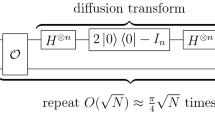Abstract.
An attack on the “Bennett-Brassard 84” (BB84) quantum key-exchange protocol in which Eve exploits the action of gravitation to infer information about the quantum-mechanical state of the qubit exchanged between Alice and Bob, is described. It is demonstrated that the known laws of physics do not allow to describe the attack. Without making assumptions that are not based on broad consensus, the laws of quantum gravity, unknown up to now, would be needed even for an approximate treatment. Therefore, it is currently not possible to predict with any confidence if information gained in this attack will allow to break BB84. Contrary to previous belief, a proof of the perfect security of BB84 cannot be based on the assumption that the known laws of physics are strictly correct, yet. A speculative parameterization that characterizes the time-evolution operator of quantum gravity for the gravitational attack is presented. It allows to evaluate the results of gravitational attacks on BB84 quantitatively. It is proposed to perform state-of-the-art gravitational attacks, both for a complete security assurance of BB84 and as an unconventional search for experimental effects of quantum gravity.
Similar content being viewed by others
References
N. Gisin, G. Ribordy, W. Tittel, H. Zbinden, Rev. Mod. Phys. 74, 145 (2002)
H. Lo, abstract of talk: From quantum cheating to quantum security, April 8, 2004, Los Alamos National Laboratory; “... quantum cryptography can come to the rescue by allowing perfectly secure communication guaranteed by the laws of physics”
M. Christandl, R. Renner, A. Ekert, A Generic Security Proof for Quantum Key Distribution, e-print arXiv:quant-ph/0402131 (2004); “Quantum-key distribution provides perfect security because, unlike its classical counterpart, it relies on the laws of physics rather than on ensuring that successful eavesdropping would require excessive computational effort”
O. Goldreich, S. Goldwasser, On the possibility of basing Cryptography on the assumption that P ≠ NP, Cryptology e-print Archive1998/005 (1998)
H. Lo, H.F. Chau, Science 283, 2050 (1999)
D. Mayers, JACM 48, 351 (2001)
A. Einstein, Grundzüge der Relativitätstheorie (Vieweg & Sohn, Braunschweig, 1956)
C. Kiefer, Quantum Gravity (Clarendon Press, Oxford, 2004)
D. Page, C. Geilker, Phys. Rev. Lett. 47, 979 (1981)
H. Everett III, Rev. Mod. Phys. 29, 454 (1957)
H.D. Zeh, Found. Phys. 1, 69 (1970)
D. Deutsch, The Fabric of Reality: The Science of Parallel Universes - And Its Implications (Penguin, London, 1997)
J. Preskill, Lecture Notes for Physics 229: Quantum Information and Computation, Caltech, September 1998
B.S. DeWitt, Phys. Today 58, 32 (2005)
Private communication with participants of the workshop “Quantum information, computing and logic”, July 2005 (Perimeter Institute, Waterloo)
C.H.-T. Wang, Class. Quantum Grav. 22, 33 (2005)
M. Cavaglia, Int. J. Mod. Phys. A 18, 1843 (2003)
N. Gisin, Helv. Phys. Acta 62, 363 (1989)
A. Kent, Phys. Rev. A 72, 012108 (2005)
J. Polchinski, Phys. Rev. Lett. 66, 397 (1991)
J. Barrett, A. Kent, L. Hardy, Phys. Rev. Lett. 95, 010503 (2005)
J.J. Bollinger, D.J. Heinzen, W.M. Itano, S.L. Gilbert, D.J. Wineland, Phys. Rev. Lett. 63, 1031 (1989)
J. Barrett, A. Kent, R. Plaga, in preparation
Author information
Authors and Affiliations
Corresponding author
Rights and permissions
About this article
Cite this article
Plaga, R. A fundamental threat to quantum cryptography: gravitational attacks . Eur. Phys. J. D 38, 409–413 (2006). https://doi.org/10.1140/epjd/e2006-00045-y
Received:
Published:
Issue Date:
DOI: https://doi.org/10.1140/epjd/e2006-00045-y
PACS.
- 03.67.Dd Quantum cryptography
- 04.60.-m Quantum gravity
- 03.65.Ta Foundations of quantum mechanics; measurement theory




